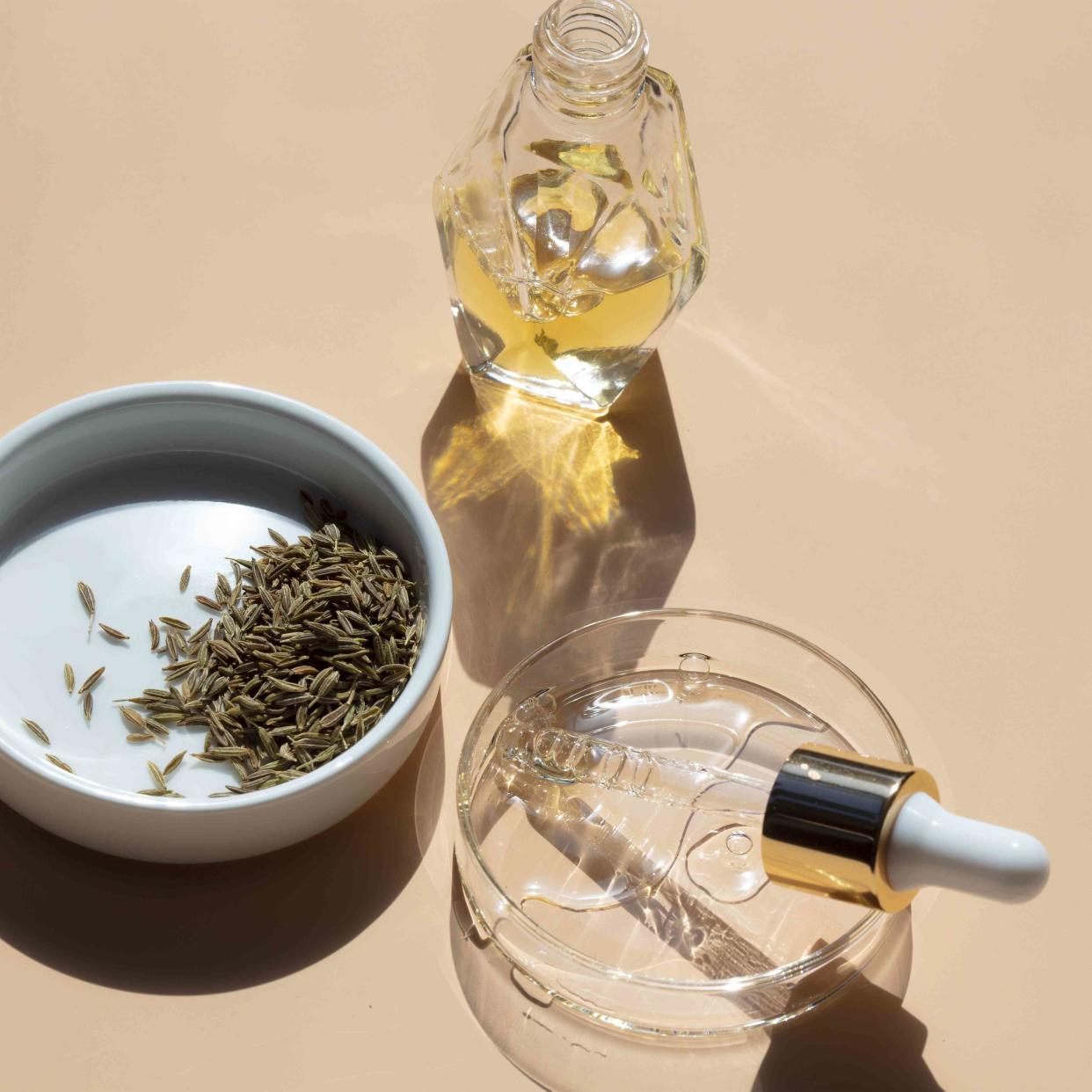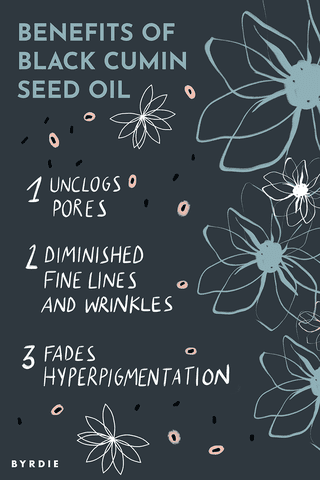The Benefits of Black Cumin Seed Oil for Skin, According to Experts

Liz deSousa for BYRDIE
Fact checked by Anna HarrisReviewed by Julia A. Siegel, MD
Discovering new skincare ingredients to be excited about is no easy task. Skincare buffs far and wide are suffering from an oversaturated market of buzzy new additions that often fail to impress. And the feat is even more arduous when it comes to natural skincare that's free of chemicals, but also effective. So when we catch wind of a new ingredient—or better yet, an oldie but a goodie comes back around—our ears perk right up. Enter: Black cumin seed oil, an ancient ingredient that's been used in the Middle East, Africa, and Asia for centuries.
We tapped skin care experts to learn all about the incredible ingredient and vet whether or not it deserves a spot in your beauty lineup. (Spoiler alert: It does.)
Meet Our Expert
Blair Murphy-Rose, MD, FAAD, is a leading board-certified cosmetic and medical dermatologist specializing in facial rejuvenation at the Laser & Skin Surgery Center of New York and Clinical Instructor of Dermatology at Weill Cornell Medical College.
Lauren Penzi, MD, FAAD, is a board-certified dermatologist at MDCS Dermatology: Medical Dermatology & Cosmetic Surgery in New York.
Aneela Zaman is a celebrity makeup artist and the founder of Zaman Skincare.
What Is Black Cumin Seed Oil?
Celebrity makeup artist Aneela Zaman, who founded an eponymous skincare line that harnesses the versatile powers of black cumin seed oil explains the ingredient has a rich history. "Black cumin seed oil is a legendary secret of goddesses like Cleopatra and Nefertiti, who used it as part of their daily beauty regimen," she says. "It is also known that the pharaoh Tutankhamun was found buried alongside black cumin seed oil almost 3300 years ago," she claims. Completely different from the orange-hued cumin from the culinary world, this product comes from a plant called Nigella sativa, sometimes also called black caraway or fennel flower.
Black Cumin Seed Oil
Type of ingredient: Antioxidant, anti-inflammatory
Main benefits: Diminishes fine lines, fights acne, unclogs pores, fades dark spots.
Who should use it: In general, black cumin seed oil is great for all skin types.
How often can you use it: It’s safe to use up to two times a day, morning and night.
Works Well With: Black cumin seed oil can be combined with many other ingredients and is often combined with other emollients, oils, and/or moisturizing ingredients such as shea butter, ceramides, beeswax, and hyaluronic acid.
Don’t use with: In general, black cumin seed oil can be used with most, if not all, ingredients.
Though precious in the East, black cumin seed oil is hardly at the tip of most American tongues. However, as the Western beauty industry increasingly turns toward natural and organic skincare methods, black cumin seed oil is catching major steam, and for good reason. "Black cumin seed oil is lighter and less greasy than some other oils on the market," notes dermatologist, Lauren Penzi. "It also tends to be a bit pricier than other skincare oils on the market."
Benefits of Black Cumin Seed Oil
Black cumin seed oil uses are aplenty— here are the main benefits for skincare.
Fights acne, clogged pores, and inflammation: According to our experts, one of the most appealing benefits of this exotic black elixir is its antibacterial and anti-inflammatory properties, which work to reduce clogged pores, control oil, and help fight acne and blemishes, as well as tame redness and soothe irritation.
Minimizes fine lines and wrinkles: You'll be hard-pressed to find an oil more nourishing than black cumin seed, which is packed with antioxidants, vitamins, and minerals. These include vitamins A, B, and C, which help the skin retain moisture, maintain elasticity, and fight the damaging free radicals that age you faster. Plus, it boasts gobs of fatty acids, which reduce signs of aging and sun damage.
Combats eczema: Thanks to its healing properties, black cumin seed oil is touted as a powerful eczema-fighter. One study found quick improvement of hand eczema among those who applied it topically twice a day for four weeks.

Potential Side Effects of Black Cumin Seed Oil
There are no known side effects to using black cumin seed oil on the skin. However, as with all oils in skincare, a little goes a long way, and applying a small amount and layering as needed will help avoid over-application. "Due to its oil formulation, overuse can potentially clog the pores and lead to an acne outbreak," says Dr. Penzi. Those with acne-prone skin should be especially conscious of overusing oils. "I am not a proponent of using oils– including 'dry oils'– on oily or acne-prone skin," echoes dermatologist, Blair Murphy-Rose. "I would recommend avoiding black cumin seed oil if you have oily or acne-prone skin. (I realize this is controversial, however, I have many patients with oily or acne-prone skin who have flared when using dry oils or oils marketed as safe for acne-prone skin!)"
Also, any product applied topically might trigger an allergic reaction, especially among those with sensitive skin types. "Like any topical skincare product, there is a possibility of skin reaction," explains Dr. Murphy-Rose. "It is always best to perform a spot test over a period of 3-5 days on your wrist, for example, prior to applying to the face."
"Caution should be taken in those with eczema-prone skin or those who are very sensitive skin," adds Dr. Penzi. "Always look for high-quality, cold-pressed, and unadulterated oils for the best results."
How to Use Black Cumin Seed Oil
Ensure your face is properly cleansed before putting on a skincare oil. If you have dry skin, massage a few drops into your skin twice daily, morning and evening, letting it penetrate for a few minutes before applying other skincare products (or makeup) on top. If your skin errs oily, try applying once a day and build your way up as needed.
Using a cleansing oil with black cumin seed, rather than a serum, is a great way to test the ingredient without worrying about congestion. Our Byrdie editors love Mullein & Sparrow's Silk Premier Cleansing Oil ($48) for melting away makeup, dirt, and oil while leaving skin balanced, lifted, and refreshed.
For a DIY approach, pick up a bottle of certified organic black cumin seed oil, and mix it with some coconut and rose-hip oils meant for an effective redness-fighting, glow-inducing concoction.
The Final Takeaway
We'll admit that oils are not a new category in the world of natural beauty, but that doesn't mean each oil doesn't have its individual merits. Black cumin seed oil boasts a host of antioxidant and anti-inflammatory properties that may plump up fine lines, fight acne, unclog pores, and fade dark spots. Those with eczema could also benefit from the oil's powerful healing properties. Compared to similar oils, black cumin seed has a lighter, less greasy consistency and may rack up a higher price tag. Although it's technically a natural ingredient, it's always wise to patch test before introducing something new to your routine. If you have sensitive skin or experience any adverse reactions, it's best to discontinue use and consider consulting with your dermatologist should you need further treatment.
Frequently Asked Questions
How can you use black cumin seed oil for dry hair?
You can try applying a few drops of black cumin seed oil to the ends of your hair for extra conditioning.
How should you apply black cumin seed oil to the face?
To get the most out of your face oil, avoid rubbing it in. Instead, try warming the oil between your fingers and apply it to the skin using a pressing motion.
Can black cumin seed oil help with pimples?
Yes, cumin seed oil is an antioxidant and anti-inflammatory ingredient that may help clear acneic skin.
Up Next: The 14 Best Face Oils of 2023, Tested and Reviewed
Read the original article on Byrdie.

